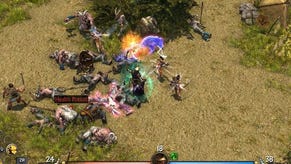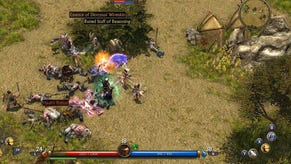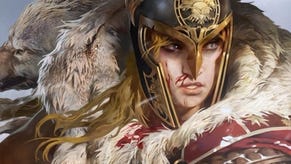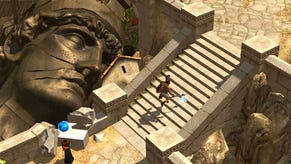Titan Quest
Let's get mythical.
Titan Quest, the new action RPG from startup developer Iron Lore, can be described as epic in more ways than one. For starters, it's nearly six years since studio co-founder Brian Sullivan began work on the game - which is a long development process by anyone's standards (apart from the people doing Duke Nukem Forever, obviously).
Then there's the sheer scale of the game in terms of the mythologies its based around and the locations you get to explore. It's not just ancient Greece and Egypt you'll visit, but also Babylon and China; and not just minotaurs and skeletons you'll face off with, but all manner of creatures invented from scratch by the Iron Lore designers themselves.
But this isn't the first time Sullivan has worked on an epic game. He co-founded Age of Empires developer Ensemble Studios, and worked on several of the series' sequels before leaving to set up Iron Lore in October 2000. That said, Titan Quest has a lot less in common with AoE than it does with another classic of the same era - Blizzard's hit action RPG, Diablo.
This isn't something Sullivan is hesitant to admit, either. "Diablo is a fantastic genre. I thought it was going to be the most cloned game out there -" but, Sullivan says, he was wrong. And so, it was decided that Titan Quest should take the best bits of Diablo and expand on them, throwing in a spanky new 3D graphics engine to boot.
The basic gameplay structure, Sullivan says, works like this: "You explore, you fight and you get rewards." Before the game begins you need to create their character - but there's no mucking about with races or hair colour or any of that nonsense, as Sullivan explains.
Lady or gentleman?
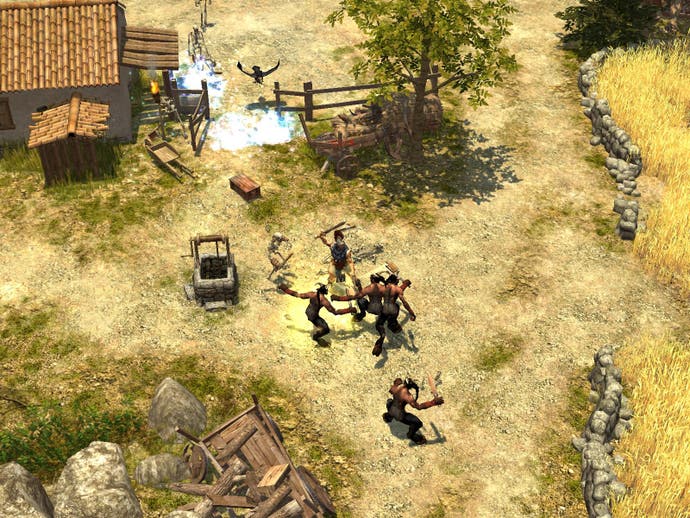
"We've actually put a lot of our character generation in the game instead of before the game. You pick your name, and your sex, and you start the game. That's it; right away, you're in the game, and the whole game can be played left mouse click, so you're clicking and having fun right away."
The thinking behind this, Sullivan says, was part of the overall aim of making Titan Quest "very approachable. A lot of what I would call classic RPG games, like Neverwinter Nights, Baldur's Gate, those types of games - you have to create a character, you're rolling dice to do things, and you have to select the look of your character sometimes down to the littlest detail...
"And in a game like Neverwinter Nights, you pretty much have to play that hour long tutorial to just to figure out how to use magic or to do pretty much anything. So it's about a three hour process before you can even start playing the game. I don't think casual people, like your Mom, are going to sit down and do that for three hours."
But as Sullivan says, things do of course get more complex once you get into the game and you're introduced to the class system. It's designed to be flexible, so there's a huge amount of choice when it comes to developing your character and customising your skills.
"During the development of the game, you'll actually pick your skill masteries - you get to pick two, and the combination determines your class," Sullivan explains.
"So when you level up the first time, you'll get to select your first skill mastery; and when you level up to the eighth level, you'll get to pick your second skill mastery. Again, we're trying to introduce this new concept of learning slowly."
Mad skills
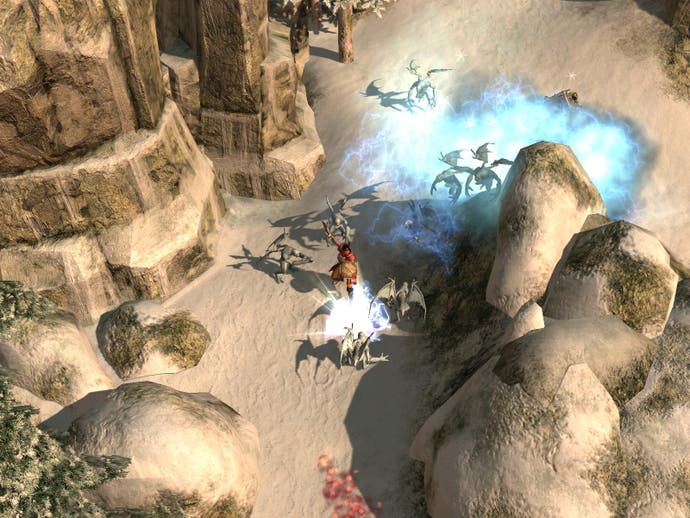
Each time you level up, you'll be awarded with skill points which you can use to enhance your skills. There's a lot of freedom here - there's nothing to stop a warrior type learning magic spells, for example, so if you want to swirl a big sword around and also chuck giant balls of blue fire at people, you have the option to do so.
It's all designed with the idea of logical progression throughout the game in mind. Unlike with some RPGs, you can pick your favourite skills and concentrate on building them up - you're not forced to forget about them once you've acquired new ones. And if you make a mistake in your decision making, it's not the end of the world: "There is some level of undo in the game. We just wanted to introduce the tougher concepts slowly, and certainly skills are a tough thing," Sullivan says.
"If you had to pick your skills before the start of the game, you'd probably be there for hours trying to figure out which skill [to choose]. But here, you get in the game, you start learning the combat system, you get one skill mastery and you only have a small number of skills to select from initially, and that makes it easier to progress."
"Then, when you pick a mastery and when you pick skills, up until you commit you can undo all that - so we don't penalise you too hard for making a quick decision."
Sullivan goes on to reveal that in some areas of the game you can find a special type of merchant who'll undo some of your skill selections, if you so desire. "We try to make it forgiving."
Clash of the titans
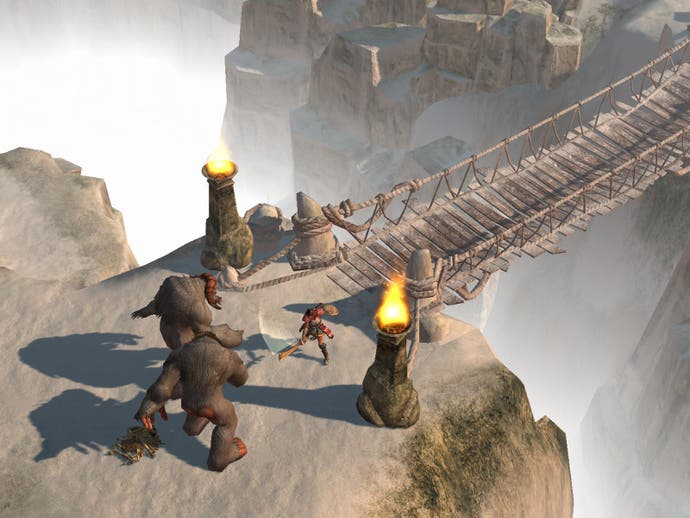
The skills you choose, of course, are key to how you'll defeat enemies - and you'll meet a wide variety of them as you visit locations such as the banks of the Nile, the hanging gardens of Babylon, the maze at Knossos and the Great Wall of China. But why did Iron Lore decide to feature so many different environments? Surely it would have been easier just to concentrate on one ancient civilisation for now?
"Well, the original byline for Titan Quest was: 'An epic adventure in the ancient world," Sullivan says.
"We felt if we just did a Greek game, it wouldn't feel very epic - we were looking for a game that went beyond what you would expect the scope of any story would be in this time period. So to do that, not only do we go to Greece, Egypt and Babylon, but we also went as far as to go to China.
"I think for a lot of players, when you're playing in the Mediterranean area, you think, 'This is great, I'm going all over.' Then when you find out, story-wise, you have to go all the way across to China, it's so out of your realm of focus that it's going to feel like a really epic game."
Many of the monsters in the game are based on mythology, and you'll recognise them if you're familiar with Ray Harryhausen's films ("Our concept artist is a huge fan of Harryhausen," Sullivan confirms). But there are also plenty of entirely original creatures to face off with, too.
All of the different monster types vary in terms of the weapons they use and their strength, as you might expect. But they also have different levels of intelligence, and different attack strategies - some will rush straight up to you and start whacking away, while others will use more subtle tactics.
Now that's logic
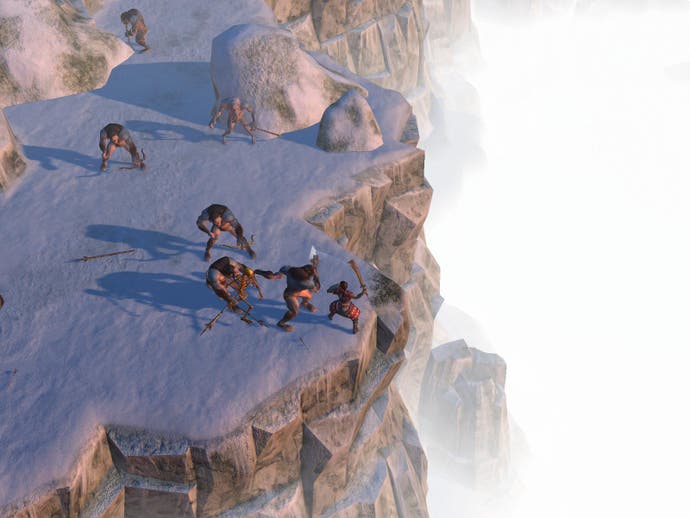
When you kill monsters, you can loot their corpses for cash and items, and then sell off any bits of equipment you don't need. But there's a logic to it - unlike with, say, World of Warcraft, where wild boars with no discernable pockets and no obvious use for two-handed swords go round dropping them nonetheless. In Titan Quest, you can see what weapons and armour your enemies are carrying before you kill them, which can help you decide whether it's worth taking them on; and plain old animals don't carry anything they'd be unlikely to have on them in real life.
So those are the basics in terms of the single player game - the multiplayer mode is being kept under wraps for now, although it has been revealed that there will be a bit of co-operative action.
But while Sullivan wasn't ready to talk more about the multiplayer game, he will reveal that he's already in talks with Titan Quest THQ publisher about producing expansion packs. He's even got an idea for where the first one might be set - although there are some problems involved.
"There's a lot of issues with doing historical games - like, we would love to do an India expansion pack, for instance, but a lot of the mythologies from back then are still practiced as religion today.
"Some areas are trickier than others. We have a lot of stories from the Age of Empires games where, when the game was near completion, we'd send it out to all the local offices, and they'd find something that was really wrong."
Korea Change
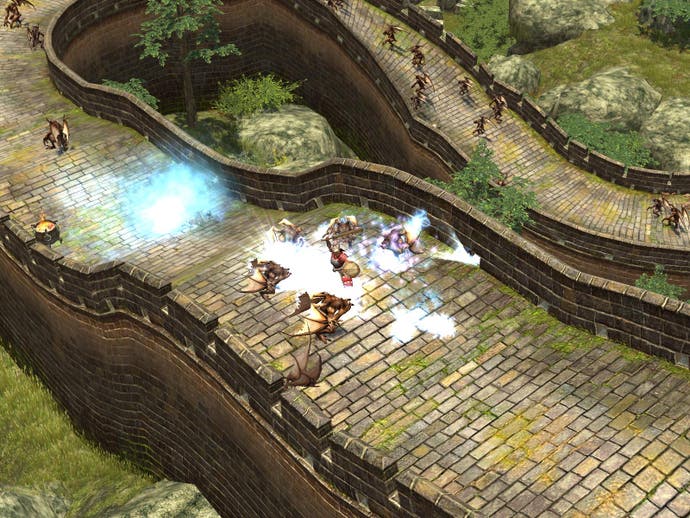
For example, Sullivan continues, "In the original Age of Empires, there was a scenario where the Japanese attacked the Koreans in a certain time period. The Korean Government told Microsoft that they couldn't release it - and that if they did, they would imprison the head of Microsoft in Korea, because they thought it wasn't historically accurate.
"There's a lot of historical books saying it was accurate, but we did some more in-depth research and it turns out it was a little controversial in terms of who was attacking who and so on. So we ended up cutting that scenario from the Japanese and Korean versions of the game. There's a lot of sensitivities out there; it's a minefield."
So, for Titan Quest, Iron Lore decided to stick with ancient civilisations and mythology - but don't go expecting everything to be historically accurate, Sullivan says.
"The mythology kind of gives us the fantasy and magic in the game, but we're really looking for what I would call Hollywood history - it gives it a historical feel, and makes you feel like you're in that place, but gameplay comes before accuracy pretty much any time for us.
"Hollywood always tries to get the feeling that you're actually there, even though the details are wrong a hundred per cent of the time. We want to give people the feeling that they're having an adventure in this time and place."
To find out whether they've succeeded, we'll just have to wait, since Titan Quest isn't out till the summer. Still, what difference does it make - we've already waited six years...

